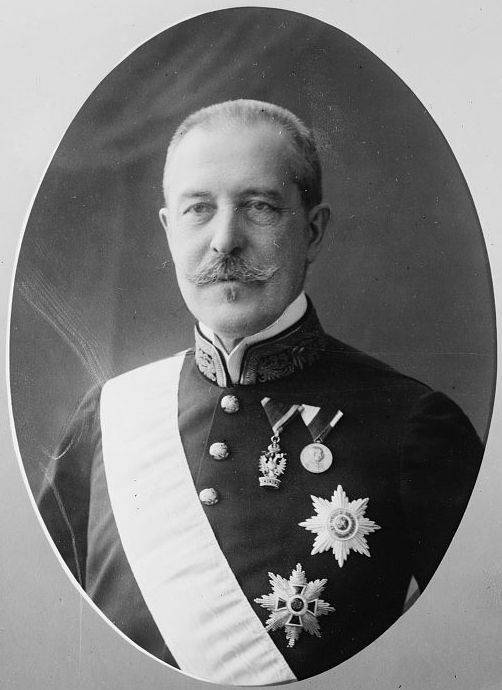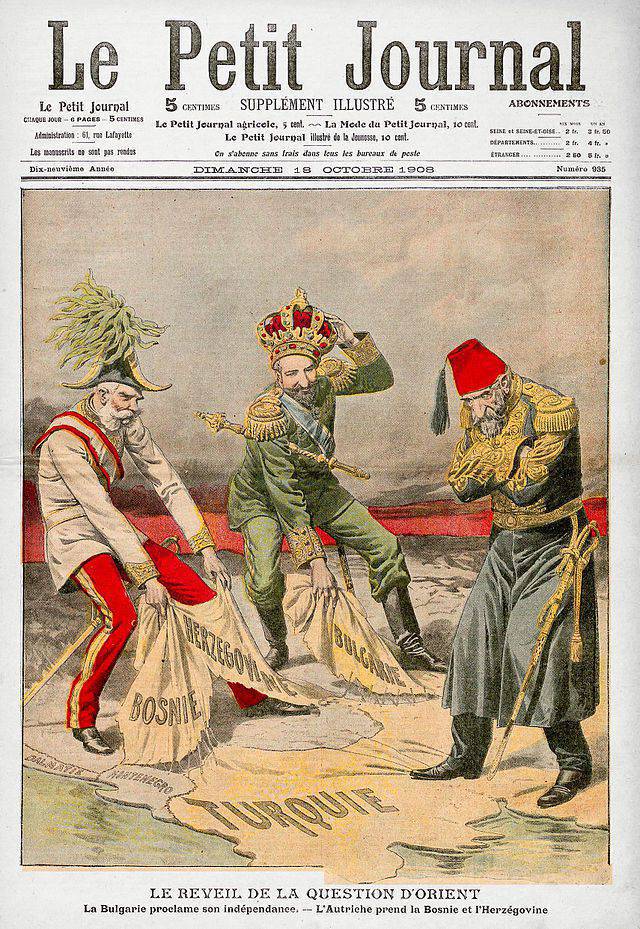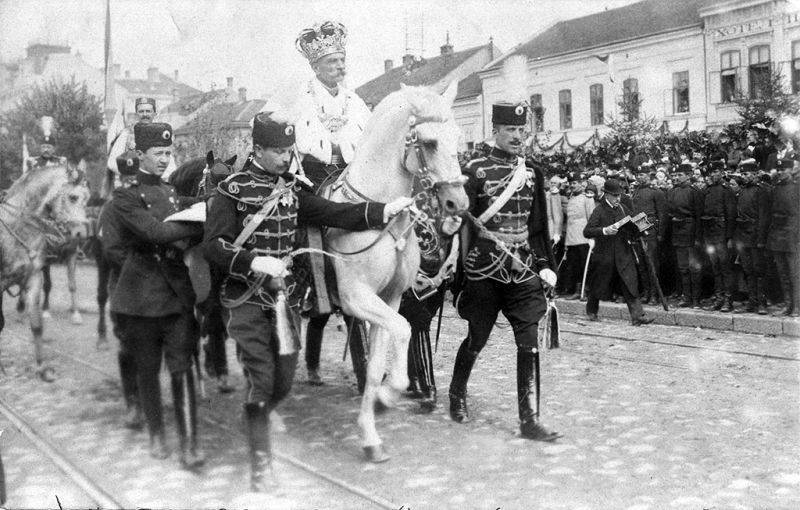Towards a catastrophe: the foreign policy of Austria-Hungary on the eve of the First World War
The most dangerous problem in Austria-Hungary was considered the Serbian question. On the night of May 29 (June 11) 1903, led by Dragutin Dmitrievich-Apis, conspirators from officers of the Belgrade garrison most cruelly killed the king and queen Alexander I and Dragh (literally cut off with sabers, the king and queen were covered with literally dozens of wounds, not counting several firearms wounds). Together with them, they also killed the head of the government, Dimitrie Tsintsar-Markovic, and the minister of defense, Milovan Pavlovich.
The conspirators (associated with European Freemasonry) were unhappy with the disgusting power of the flighty queen, under whose heel was a weak spouse, corruption and theft, which flourished under Obrenovic, and the pro-Austrian policy of King Alexander. However, this does not justify the heinous crime that they committed. In addition, there was a sharp turn in the foreign policy of Belgrade. Serbia became a source of war in the Balkans, which did not suit Russia, but did suit certain circles in France and England who wanted to start a big war in Europe and necessarily with the participation of the Russians.
A middle-aged prince Peter Karageorgievich, a descendant of Black George (Karageorgiya), the hero of the struggle for the independence of Serbia, who fought with the Ottomans at the beginning of the XIX century, ascended the Serbian throne. The events in Belgrade had a great influence on European politics. The new king Peter I Karageorgievich was very popular among the Serbs. The Serbian king was friendly towards Russia. But frightened by the terrible fate of his predecessor, Peter was under the strong influence of the military elite. At that time, the military elite were controlled by the radical nationalist organization Black Hand. The ideas of great Serbian nationalism, Yugoslavism and panslavism dominated the military environment. The younger son of the monarch - Prince Alexander, himself was in the "Black Hand". As a result, the influence of the Habsburg state in Serbia has fallen dramatically, while Russia's influence has grown. However, Russia was “loved” in the Serbian radical circles in a peculiar way. Serbian patriots wanted Russia's support in creating the “Great Serbia”, which violated the interests of Austria-Hungary and the existing situation in the Balkan Peninsula. Bosnia and Herzegovina, as well as all the lands of the Habsburg Empire inhabited by southern Slavs, should have entered the “Great Serbia”.
In addition, the erroneous economic policy of the Austrian government contributed to a serious deterioration in the relations of Austria-Hungary with the Serbian kingdom. Until the beginning of the 20th century, Serbia was in economic dependence on the Habsburg Empire. About 90% of Serbian exports went to the Austro-Hungarian Empire (live cattle, meat, fruit (agriculture was the basis of the Serbian economy), some types of fabrics, etc.) The industrial goods of Austrian and Hungarian enterprises (from weaving machines before armament). In 1906, the Serbs entered into a customs agreement with Bulgaria, which reduced the dependence of the Serbian market on the industrial output of Austria-Hungary. In response, the Austrian and Hungarian authorities began a customs war, the so-called “War of pigs” (the main article of Serbian exports). However, the economic war only strengthened the economic independence of Serbia. Belgrade reoriented to other markets. So, instead of Czech-made rifles, the Serbs began to buy products from the French firm Schneider-Creuse. Part of Serbia reoriented to Germany, although this caused irritation of the Austrians. As a result, by 1910, the Serbian market was almost lost for Austria-Hungary. Together with economic influence, the Austro-Hungarian government also lost remnants of political influence in the Serbian capital.
Petr Karageorgievich at the coronation
Contradictions with Russia
The loss of economic and political influence in Serbia and the growth of nationalist sentiment in the Serbian military-political elite caused serious concerns in Vienna and Budapest. In Vienna, they were afraid that Russia behind the back of Serbia would increase its influence in the Balkans, gain control over the Bosphorus and the Dardanelles, and through them - over the entire Eastern Mediterranean. This contradicted the interests of Vienna, for which the Balkans were a “soft underbelly,” from which came the greatest threat to the stability and the very existence of the Hapsburg state. This threat has long frightened the Austrian elite. In 1853-1854, when Russia could easily defeat Turkey, this threat was eliminated due to political betrayal, when the Vienna court — then traditional ally of Russia, against the Ottoman Empire, France, and the claims of Prussia — supported France and England, although he withheld from joining in war with Russia. Thanks to the intervention of other great powers, the Hapsburgs in 1878 again managed to prevent the final approval of Russia in the Balkans and the creation there of a large Slavic state (“Yugoslavia”), which would unite the southern Slavs and under the auspices of Russia, would become a powerful counterweight to the Austro-Hungarian Empire. At the beginning of the 20th century, the “Slavic-Russian threat” again began to frighten Vienna.
After Vienna took a position hostile to Russia in the Eastern War, Petersburg pursued a generally anti-Austrian policy. Of great concern to the Russian government was the diplomacy of the Habsburg monarchy in Bulgaria and Romania. Both of these countries in Vienna were seen as a counterweight to a growing Serbia, and therefore Russia. Austria-Hungary had an agreement with Romania, which in 1896 was supplemented by a secret protocol on military matters. As a result, Romania could end up in a Central Powers camp. However, not everything went smoothly with Romania, it pursued a policy of "sitting on two chairs." The union was concluded by King Carol, who came from the younger branch of the Hohenzollern clan and was pro-German. But the parliament and government did not support this alliance, since there were many supporters of the alliance with France and Russia. The structure of Austria-Hungary included Transylvania with a large Romanian community, and the Romanian nationalists put on the support of Russia and France to snatch this historical region. This interfered with a genuine union of Austria-Hungary and Romania.
The situation was difficult in Bulgaria. The Bulgarian prince (from 1908, the king) Ferdinand I of Saxe-Coburg-Gothic dynasty claimed the leadership of Bulgaria in the Balkan Peninsula. In his opinion, Bulgaria was to become the main heir to the European legacy of Porta. Ferdinand even dreamed of seizing Istanbul-Constantinople. However, Bulgaria’s internal forces were not enough for this. In addition, in the country itself there was an internal struggle between supporters of a return to an alliance with the Russian Empire and politicians who were guided by Vienna and Berlin. King Ferdinand deftly maneuvered between opposing political factions. In 1912 — 1913 as a result of the First Balkan War, Turkey was defeated. Bulgaria took from the Ottomans a significant part of Thrace with Edirne (Adrianople). Turkey also lost most of Macedonia with access to the Aegean Sea. However, Macedonia became a disputed territory between Bulgaria, Serbia and Greece. The irrepressible appetite of the Bulgarian leadership led to a war against the former allies - Serbia and Greece (the Second Balkan War). In the new war, the Bulgarian army suffered a heavy defeat from the former allies. Bulgaria was forced to return part of Thrace, including the region of Edirne, which included Turkey in the war. The diplomatic struggle in Bulgaria lasted until the 1915 year, until finally the supporters of the alliance with the Austro-Hungarian and German empires won.
The annexation of Bosnia and Herzegovina. Bosnian crisis
In the Balkan Peninsula, the Austro-Hungarian government found itself in a difficult situation. The military-economic potential of the Austro-Hungarian Empire was enough to defeat Serbia, but behind the Serbs was a huge Russian power. And it was impossible to count on success in a possible war with the Russian Empire. Therefore, the Vienna court had to behave carefully in relation to Belgrade. German support could change the balance of power. But the German government for the time being tried not to aggravate the situation. Moreover, the German economic expansion on the Balkan Peninsula was in conflict with the interests of Austria-Hungary. It was not possible to use Turkey as a counterweight to Russia, since Istanbul was so weakened by internal problems that it was not considered as a serious ally.
However, despite all the problems, the foreign policy of Vienna has become harsh, offensive. The offensive strategy was initiated by Baron (later the graph) Alois von Herenthal, who in 1899 — 1906. was ambassador in St. Petersburg, in 1906 — 1912 - Minister of Foreign Affairs of Austria-Hungary. Eretale was a man of initiative and decisiveness. He replaced Foreign Minister Agenor Goluchowski, who conducted a cautious, generally conservative policy, avoiding taking initiative in resolving issues, as well as proactive actions. During his time in the Balkans, the status quo was maintained in the Balkans.
Interestingly, when Erenthal served as ambassador to St. Petersburg, he learned the Russian language well and enjoyed sympathy at the court of the Russian Tsar Nicholas II. Erenthal himself was not a hater of Russia, moreover, he considered the “union of three emperors” (Germany, Austria-Hungary and Russia) a political ideal. Therefore, the fact that Russian-Austrian relations were greatly aggravated under Erenthal can be considered the irony of history.

Graf, Foreign Minister of Austria-Hungary (1906 — 1912) Alois von Herenthal
Meanwhile, Germany, finally taking the path of confrontation with France, Russia and England, needed to strengthen its alliance with Austria-Hungary. In 1908, Chancellor Bülow explicitly stated that Germany in the Balkans has only economic interests and wishes, the needs and interests of a friendly Austria-Hungary will be decisive for Berlin. Thus, Berlin blessed Vienna to expand expansion in the Balkans.
For years 30 Bosnia and Herzegovina de facto was part of the Austro-Hungarian Empire. The Austrians occupied the province in 1878. De jure, this province was part of the Ottoman Empire. From the Turkish authorities in this area, almost nothing is left, except that the flags with a crescent moon, which hung on holidays. The situation of the province was strange. Neither Tsisleytaniya (lands directly controlled by the Austrian imperial crown), nor the Hungarian kingdom did not want to take the province under their care, fearing further aggravation of national and religious conflicts: more than 40% of the region’s population were Orthodox Serbs, more than 30% were Bosniaks, Slavic Muslims and more than 20% - Croatian Catholics. Therefore, the province was governed by the imperial and royal ministry of finance. The political, interethnic and religious situation in the province was calm, as the Austrians tried not to oppose the local people to each other. The authorities have done quite a lot for the economic and social development of the formerly backward province of the Ottoman Empire.
Herenthal believed that the final annexation of Bosnia and Herzegovina, that is, the legal adherence to the Habsburg monarchy, would strengthen the position of the empire on the Balkan Peninsula. In addition, the Young Turk coup took place in Turkey and the constitution was restored. Bosnia and Herzegovina formally remained part of Turkey and had the right to send their deputies to the Turkish parliament. This could lead to the strengthening of Turkish influence in the province, weakening the power of Vienna and threatened future unpredictable consequences. 19 August 1908, Herenthal, at a cabinet meeting, said that he had time to annex Bosnia and Herzegovina. In his opinion, this could be done without causing serious diplomatic complications. This idea was supported by the head of the Austrian General Staff, Konrad von Hoetcendorf, and other supporters of the decisive actions of Austria-Hungary. At the same time, the heir to the throne, Franz Ferdinand, who previously had a good relationship with Erenthal and Hetzendorf, considered the annexation to be an adventure: “I am resolutely opposed to such demonstrations by force, given the poor condition of our household affairs ...”. The aged emperor hesitated. The temptation to annex the province was high, but the actions of Vienna could cause a conflict with St. Petersburg, which was not part of the plans of Franz Joseph.
Austrian Foreign Minister von Herenthal reached an agreement with Italy, promising that the Habsburgs would not interfere in the future Italian-Turkish war for the possession of Libya. It stabilized relations with Italy. I was also able to agree with Istanbul. Turkey received compensation for the annexed land in 2,5 million pounds. In addition, Vienna waived claims to Novipazarsky sanjak. Germany, which at that time gained great influence in Turkey, supported this agreement.
Herenthal promised to reach an agreement with Petersburg. 15-16 September 1908 of the year in the castle of Buchlau (Buchlov in Moravia) a meeting took place between Russian Foreign Minister Alexander Izvolsky and Herenthal. The parties reached a preliminary informal agreement. Vienna recognized the right of St. Petersburg to the free passage of its warships through the Bosphorus and Dardanelles. Petersburg recognized the Austrian annexation of the disputed province. In fact, the annexation of Bosnia and Herzegovina did not concern Russia's economic and military-strategic interests. Austria-Hungary took only what 30 had owned for years.
However, the reaction of St. Petersburg was stormy. This was due to the fact that Izvolsky had no authority to conduct such negotiations, and the fact that Herenthal had deceived Izvolsky (according to Izvolsky). Vienna did not wait for the "right moment" for the two powers. The Austro-Hungarian government 5 October 1908 of the year announced the annexation of the disputed province and the support of the Russian government for this action. The Russian minister, who was at that time in Paris, learned about Erenthal's demarche from the press and disavowed all the agreements (in Russia, the public subjected Izvolsky to harsh criticism). Petersburg was supported by Paris and London. But the French and the British were not particularly upset, they were more concerned about the issue of the straits. No decisive action was taken in relation to Austria-Hungary.
Istanbul was formally outraged because it was afraid to provoke the public into unrest. The Ottoman Empire declared a boycott of Austro-Hungarian goods. Especially alarming in the Balkans was the fact that almost simultaneously with the annexation of Bosnia and Herzegovina, Ferdinand of Bulgaria declared himself king, and Bulgaria was completely independent of Turkey (Bulgaria was formally an autonomous principality under the suzerainty of the Sultan). However, Istanbul was soon satisfied with the money handout. And Bulgaria was recognized as an independent state.
But Serbia was especially indignant. For Serbia, Bosnia and Herzegovina was of economic, political and military interest. The transition of Bosnia and Herzegovina, where the Serbs were the largest community, under the control of Vienna, buried plans to create a “Greater Serbia”. Serbia’s military strategic position was deteriorating, now the Serbian state was surrounded by Austro-Hungarian territory from three sides. In Serbia and Montenegro it was believed that Bosnia and Herzegovina is historically a Serbian province, so it should be divided between them and enter the all-Serbian space. On October 6, the Serbian and Montenegrin governments announced mobilization in their countries. Belgrade has allocated additional funds for military spending. October 8 Berlin promised Vienna assistance in the event of an expansion of the conflict. The Austrian hawks, led by von Hoetzendorf, wanted to solve the conflict with Belgrade by military means. In Austria-Hungary began to mobilize, the troops concentrated on the Serbian border. It went to war.
However, the war did not start. And Serbia, Austria-Hungary acted with an eye to Russia. The readiness of the Central Powers, especially the Austro-Hungarian Empire, for the war was incomplete. Therefore, Berlin, although it acted tough, but tried to normalize relations between Vienna and St. Petersburg by diplomatic means.
Russia, weakened by the war with Japan and the revolution, did not want to fight, especially given the position of Germany, which announced support for Austria-Hungary. The head of the Russian government, Pyotr Stolypin, who best understood the danger of involving the empire in the great European war, came out categorically against a direct clash with the Germans and the Austrians. He noted that "to unleash a war is to unleash the forces of the revolution."
The Serbs were inspired to exercise restraint. 2 March 1909 representatives of Russia, England, France, Italy and Germany suggested Belgrade to recognize the annexation, in order not to bring the matter before the war in Europe. 10 March The Serbian government refused to recognize the annexation of Bosnia and Herzegovina. 22 in March, German Ambassador to the Russian Empire, Count Pourtales, handed Izvolsky "proposals for resolving the crisis" (in fact, an ultimatum). Russia should immediately give a clear answer: refuse to recognize the annexation or recognize it. In case of refusal to recognize the annexation, Berlin made it clear that Austria-Hungary is attacking Serbia. Berlin also demanded to stop diplomatically supporting Serbia. Russian emperor Nicholas II accepted all the demands of Berlin. Under pressure from Russia and England, 31 March, 1909. Serbia recognized the annexation. Contemporaries called this failure of Russian diplomacy - “diplomatic Tsushima”. The Bosnian crisis was over.
Vienna was celebrating victory, but this victory was Pyrrhic. Big money spent on the mobilization and mercy of Turkey. Relations with Russia turned out to be completely spoiled. Anti-Austrian sentiments in Serbia, Bosnia and Herzegovina sharply increased. The Austro-Hungarian Empire received several million more Slavs, among whom were many Serbian patriots. As a result, the national, religious, and political tensions in the Habsburg state increased even more.
Europe is even closer to war. Germany, having forgotten the precepts of Bismarck, who did not want to spend a single grenadier for the sake of the "Eastern Question", actively supported Austria-Hungary.

To be continued ...

Information